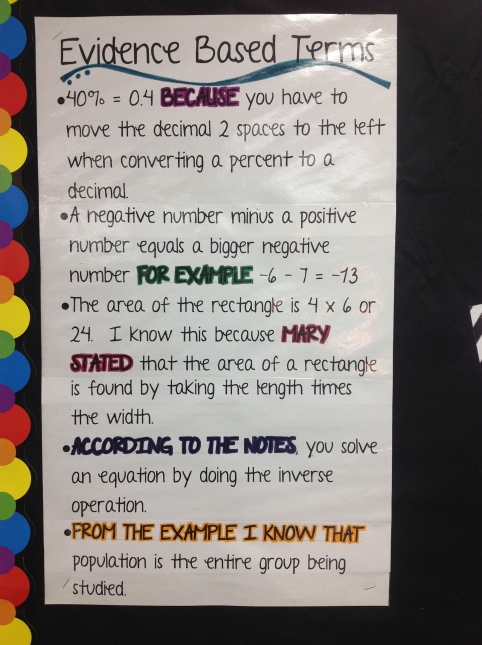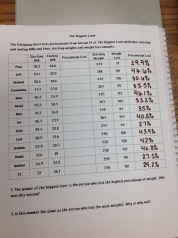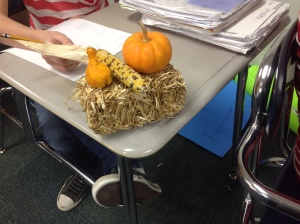Polynomials Doodle Notes – I’ve got a ton of different kinds of doodle notes!
Evidenced Based Terms for Math

Evidence is a big buzz word right now, but I feel like there is so much centered in the ELA world. I made this poster for some math evidence.
Apathy
The #msmathchat this week was on apathy. Apparently my students follow me on twitter because Wednesday they decided to challenge me with some major apathy which lead to some epic speeches. Seriously, if only they were recorded because we are talking award winning. Basically, I had two different issues going on.
Major theme #1- This is hard, so I’m just going to sit here and not do it, not ask questions, not even make an attempt.
For this problem, I went with the honesty approach. I stopped everyone and told them I had a major concern. And that was apathy. No one knew what that meant, so we looked it up and discussed it. I told them I was very concerned about what I was witnessing. I explained exactly what I was seeing and exactly what impact this would have on their future. I made them a promise. I promised them that I would continue to give them really challenging problems and that I wasn’t going to stop because they were frustrated and giving up on themselves. I told them they were worth learning the material. I talked about how life only gets harder from here. I talked about some of the professional challenges teachers face and how that has made me want to give up sometimes, but where would I be if I gave up on myself. I also talked about how great I felt when I tried at something difficult and succeeded. That it feels a million times better to succeed at something difficult when you know you have worked really hard and didn’t give up. And I felt like it worked. They listened, they responded, and they got right to work. And they were pretty successful. But I also reminded them that if they had always given up on themselves when it came to math that the first few challenges would be really difficult, but that every time they succeeded it would get a little bit easier next time. Then I ended class with a good old cheer of “what’s our motto? No apathy!” Today when this group came back in, I gave a recap speech and my plan is to remind them of what we talked about regularly.
Major theme #2- Since you gave me a difficult problem, I am going to get mad when you don’t spoon feed me the answer.
I stuck with the honesty policy for this one as well. I made this group the same promise- that I was going to continue to give them really difficult problems. And I wasn’t going to stop just because they didn’t like it. I talked about how it would be a lot easier on me to just show them how to do the one problem we had been talking about for a half hour that I made them redo and redo until it was right. Then I told them to think about how much I value my own class time with them. And to think about how important it must be for them to understand this problem and stick with the struggle if I am willing to spend this much class time on it. I also told them that I would proceed to spend my entire class period on the problem, and the next period if needed to get them to where they needed to be. I even threw in a “If you stick with me I will make you the best mathematician you have ever been.” It was inspirational. Then we talked about attitude. And how sometimes when we are frustrated we show our frustration by being rude to others, but how that wasn’t an answer. And we talked about how if you weren’t ever taught how to sit with a struggle or you hadn’t done it a lot before, that it would be really difficult to do that the first time. And I talked to them about how the people who really care about us want to teach us to do things on our own and succeed on our own, not depend on us for everything. And I told them how much I cared about them and what I saw for their futures if they joined me on the journey. And I will be honest, the ones who were mad were still mad. And I’m guessing that’s because they are middle schoolers. But then today, I reminded them of my epic speech and did a recap and I saw a slight change. They were on my side. And I think that’s because they know I am on theirs.
For you @JustinAion, maybe it will actually make a difference!
The Biggest Loser
Just a quick post- we started a unit on percents today. Found this activity from Illuminations, but I needed it to be a little bit more. The activity takes the BMIs and weights of season 14’s contestants and students need to find the percent lost for each in order to find out who won the game. We then had a discussion on why the show does not award the prize to the person with the most weight lost, but the highest percentage.
Spending an entire period on one problem…
I have been reflecting on my teaching journey lately.
Year 1: No clue. Survivor mode.
Year 2-6: Thinking I’m getting better and better each year. Still clueless.
Year 7: Blogging begins. My eyes are opened to what’s out there. I start to really examine what I’m teaching and create some more interactive activities.
Year 8: Realize that I was clueless last year. Start acting like my 2 year old. Ask why more times than I can count. Spend countless minutes in dead silence because I’m not going to let a student out of figuring out the answer. Focus totally shifts from getting the answer to a problem to how many questions can I ask and how can we apply this knowledge and making sure every single student is proving proving proving and then saying it just one more time for fun. Hoping that I’m on the right track now and I won’t discover more cluelessness next year. But for now…
I put up a problem yesterday. I’m blogging on my phone with a baby falling asleep in one arm and a 2 year old leaning against my other side, so you don’t get a picture. The problem was from the Smarter Balanced practice problem section for middle school. There is a number line and 4 boxes marking spots on the line. You had to drag 4 problems: -3 1/2 – 3 1/2; -3 1/2 + 3 1/2; -3 1/2 – (-5); and -3 1/2 + (-5) to their spots. And the eyes glazing over starts… Fractions. So I tell them they aren’t allowed to add or subtract any numbers. They were only allowed to look at the numbers and the signs and figure out where the problems could go based on those things. The number 0 was marked on the number line. We talked about zero pairs and how to take care of that one first. Then on to deciding which answer would be positive. Then deciding between the 2 negative answers. Then we discussed how one arrow was pointing to a whole number marker and one was in the middle of the markers and what we could do with that information. And over and over and over we looked at that one problem. I’ve never talked less and had students talk more. (Except on Socratic circle days!) We never actually got to solving the problems, but I think, I hope, they learned so much more!
I read this post today, and think it is so true. I used to hope I would finally create unit/lesson plans that I could use 2 years in a row. And now I hope that never happens because that would mean I am done finding new ways to reach students.
Mini Review Units/ Integers
One of the things I have decided to do this year is to have mini review units in between each of my larger units. So this year, I did a Rational Numbers unit, then an Expressions and Equations unit. Now I am going to spend the next week reviewing rational numbers before going on a to a new unit. After that unit, a rational numbers review week again, then an expressions and equations review week. I am hoping that these mini units will keep students on top of the material we learned before and help them to realize that just because a unit is over doesn’t mean that they aren’t responsible for the material again. On Friday, we did The Great Integer Race. Each student got an addition or subtraction problem and they had to silently walk around the room and find the person with a problem that would result in the same answer. But then, I added a next step. We have been working on putting in Claims, Evidence, and Reasoning piece into our plans this year. Once students found their matches, they had to write how they knew that their match was correct. They switched their problems on the way back to their seats, then did the whole thing 4 more times. It was pretty basic, but helped to review some skills they had learned in the past.
Socratic Circle- Fundraisers
One of the high points of my year last year was when I did a Socratic Circle in my class. We used a lesson from Robert Kaplinsky’s website– by the way, I am so happy to see that recently everyone seems to have found the awesomeness that he has on there, cause it is great! We just completed another Circle this week, although we didn’t use one of his lessons, I’m planning on using a bunch of them during my next unit.
This time, we use a problem on fund raising from Math Gains. I liked this problem to do early in the year because the math was pretty basic and there was no clear right or wrong answer. Students were able to bring in many other considerations in addition to the math behind the fund raising to support their reasoning.
Yet again, this proved to be an amazing activity because it got the kids talking about math. So many kids surprised me. Students who have barely spoken in class were suddenly in the inner circle debating. After day 1, I had a student who will barely lift a pencil in class yell “no!” when I said class was over and run up to me excitedly to tell me how great this activity was because it was a real world problem.
I’m trying Box instead of Scribd because apparently Scribd needs a password now. If you need anything I have previously uploaded to Scribd, please ask. I am happy to email you the documents. Excuse the formatting if it is off, I used a fun font 🙂
One Solution, No Solutions, Infinite Solutions
Today we solved special case equations that had one solution, no solutions, or infinite solutions. I found Sarah’s Solving Special Case Equations which was awesome. I used her worksheet as a warmup. Just as happened in her class, the kids wanted to ask me all sorts of questions on the two problems that had so solution. Many of them tried negative numbers, but they didn’t work. But it was a great way to get them started thinking about equations and solutions.
Then we did her amazing foldable, but I did type it up so the kids could just fill in what I needed them to. Here it is: foldable
After that, I modified a MAP Lesson Solving Linear Equations in One Variable into a sorting activity and added a piece for claims, evidence, and reasoning. Here it is: Solutions Sort
This picture won’t cooperate- so turn your head!
On another note- here is why I love teaching middle school. A student came in on Monday and placed a pumpkin on her desk. I asked her what it was for and she replied, “decoration.” Tuesday it turned into a pumpkin and corn, and by Wednesday it was this:
Today is Thursday, so we will see what it turns into today! Middle schoolers are so funny!
Calling on Students
I’ve been doing something amazing this year. It is something that I always knew I was supposed to be doing but was super nervous to do it and I don’t know why. I am calling on random students. Actually, I’m not. I’m not pulling popsicle sticks or numbers or using a fancy app. I’m calling on whoever I want to whenever I want to. My goal is to have every student in class answer at least 3 questions in very class. I’m calling on students who I know will struggle with my question so I can walk them through the struggle and bring them out the other side. I’m calling on students who answer “I don’t know” and I’m not accepting it. I’m asking why more times than my 2 year old. I’m asking the same question 50 times and hearing the same answer 50 times in 50 different ways.
And it is
AMAZING.
The leap in engagement in my class is huge. And then, there’s the scores. They are hitting my assessments out of the park. Because they know their stuff.
Go do it. Once you start you will be addicted.
Explore MTBoS- Socratic Circles
I’ve been around the MTBoS for a little over a year now and it is hands down the biggest thing to change what I teach and how I teach it. I haven’t posted much recently due to the birth of my twins (also a 2.5 year old!), but I hope to get back as things start to normalize around here. I do read other blogs all the time- that’s easy to do 1 handed while feeding a baby! Currently attempting to post doing the same. Pretty slow going typing with one hand on my phone.
My favorite thing to do in class is a Socratic Circle. Last year I did one near the end of the year using one of Robert Kaplinsky’s lessons. Check them out- they are great! I am planning another one right now that I will post about after I do it… And when all 3 kids are sleeping at the same time.
Here is my previous post on the Socratic Circle- hereand here





